Mobile Menu
- Education
- Research
-
Students
- High School Outreach
- Undergraduate & Beyond: Community of Support
- Current Students
- Faculty & Staff
- Alumni
- News & Events
- Giving
- About

U of T Medicine Professor Claire Pane with Toronto Addis Ababa Academic Collaboration participants.
Grand Challenges Canada has announced funding for 15 innovative projects designed to improve mental health diagnosis and care in developing countries, many of which are nations ravaged by conflict, disaster and poverty.
Dr. Clare Pain, Professor in U of T Medicine’s Department of Psychiatry and coordinator of the Toronto Addis Ababa Academic Collaboration (TAAAC), is the recipient of a $1 million grant for the Biaber Project - Scaling up Interpersonal Psychotherapy (IPT) for Common Mental Disorders in Ethiopia. The project will train a network of Ethiopian health workers to provide culturally-sensitive mental health treatment to people in their own communities.
Dr. Pain quotes an Amharic saying: “der biaber anbessa yaser,” that means together, a spider web will tie a lion. With co-principle investigator, Dr. Dawit Wondimagegn of Ethiopia, Dr. Pain and her team will help tame the lion of mental illness in Ethiopia. One contributing factor to mental health disorders is domestic violence which has a high occurrence in rural Ethiopian families. The violence can lead to depression, anxiety and suicide and those who suffer mental illness are often severely stigmatized. This project will test improved screening for mental health disorders and make treatments available to many who previously could not access care.
Brain drain is a major issue in Ethiopia with over 80 per cent of foreign-trained Ethiopian physicians not returning to practice in their home country. The vision of the Toronto Addis Ababa Academic Collaboration (TAAAC) is to train professionals in the country, replicating and sustaining advanced training programs over the long term, thus decreasing the need to train abroad.
Globally, close to 450 million people have mental health disorders and more than 75 per cent of those individuals live in developing countries. To make matters worse, the World Health Organization says 85 per cent of individuals living in the developing world with serious mental disorders receive no treatment at all.
“Mental health disorders are a leading cause of suffering and disability everywhere, but the problem is especially acute in the developing world,” says Dr. Peter A. Singer, Professor of Surgery in U of T’s Faculty of Medicine and Chief Executive Officer of Grand Challenges Canada.
“There is very little funding for mental health innovations in low and middle income countries where mental illness is the most neglected of many neglected diseases. It’s a terrible denial of human potential.”

